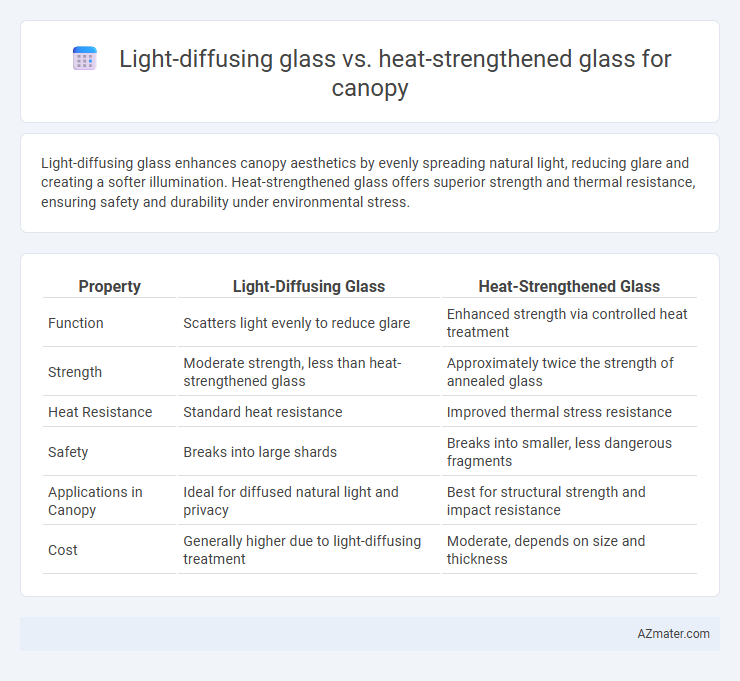Light-diffusing glass enhances canopy aesthetics by evenly spreading natural light, reducing glare and creating a softer illumination. Heat-strengthened glass offers superior strength and thermal resistance, ensuring safety and durability under environmental stress.
Table of Comparison
| Property | Light-Diffusing Glass | Heat-Strengthened Glass |
|---|---|---|
| Function | Scatters light evenly to reduce glare | Enhanced strength via controlled heat treatment |
| Strength | Moderate strength, less than heat-strengthened glass | Approximately twice the strength of annealed glass |
| Heat Resistance | Standard heat resistance | Improved thermal stress resistance |
| Safety | Breaks into large shards | Breaks into smaller, less dangerous fragments |
| Applications in Canopy | Ideal for diffused natural light and privacy | Best for structural strength and impact resistance |
| Cost | Generally higher due to light-diffusing treatment | Moderate, depends on size and thickness |
Introduction to Canopy Glass Solutions
Light-diffusing glass enhances canopy aesthetics by softening natural light and reducing glare, creating a comfortable outdoor environment. Heat-strengthened glass offers increased thermal resistance and mechanical strength, making it ideal for safety and durability in canopy applications. Both options cater to different functional needs, with light diffusion prioritizing visual comfort and heat-strengthening focusing on structural integrity.
What is Light-Diffusing Glass?
Light-diffusing glass is designed to scatter natural light evenly, reducing glare and creating a soft, uniform illumination ideal for canopy applications. Unlike heat-strengthened glass, which primarily focuses on enhanced strength and thermal resistance, light-diffusing glass enhances visual comfort while maintaining adequate structural integrity. This type of glass helps protect occupants from harsh sunlight and improves energy efficiency by minimizing the need for artificial lighting under canopies.
What is Heat-Strengthened Glass?
Heat-strengthened glass is a type of safety glass that undergoes controlled thermal treatment to increase its strength to about twice that of annealed glass, making it more resistant to impact and thermal stress, ideal for canopy applications where durability is critical. Unlike light-diffusing glass, which primarily focuses on scattering light to reduce glare and enhance aesthetics, heat-strengthened glass emphasizes structural integrity and safety, ensuring better performance under wind loads and temperature variations. This glass is less likely to break unexpectedly, and if it does, it fractures into larger shards, reducing the risk of serious injury compared to annealed glass.
Key Differences: Light-Diffusing vs Heat-Strengthened Glass
Light-diffusing glass is engineered to scatter light evenly, reducing glare and creating a softer, more uniform illumination ideal for canopy applications requiring aesthetic appeal and comfort. Heat-strengthened glass undergoes thermal treatment to enhance strength and resistance to stress, offering improved safety and durability under environmental conditions without necessarily altering light transmission. Key differences include the functional emphasis on light diffusion versus structural reinforcement, with light-diffusing glass optimizing visual performance and heat-strengthened glass prioritizing mechanical resilience.
Benefits of Light-Diffusing Glass for Canopies
Light-diffusing glass enhances canopy aesthetics by evenly distributing natural light, reducing glare and creating a softer ambiance beneath the structure. This type of glass improves energy efficiency by minimizing heat buildup and lowering cooling costs, making it ideal for outdoor covered areas. Its ability to preserve privacy while maintaining transparency adds functional value to canopies compared to traditional heat-strengthened glass.
Advantages of Heat-Strengthened Glass for Canopy Design
Heat-strengthened glass offers superior impact resistance and enhanced thermal durability compared to light-diffusing glass, making it ideal for canopy applications exposed to varying weather conditions. Its ability to withstand higher stress levels reduces the risk of breakage, ensuring increased safety and longevity in architectural designs. This type of glass also maintains clarity and structural integrity while providing improved resistance to thermal shocks, crucial for canopies exposed to direct sunlight and temperature fluctuations.
Performance Comparison: Light Diffusion and Thermal Resistance
Light-diffusing glass for canopies excels in evenly dispersing natural light, reducing glare and enhancing visual comfort, while heat-strengthened glass primarily provides increased toughness and resistance to thermal stress. In terms of thermal resistance, heat-strengthened glass withstands higher temperatures and rapid temperature changes better than light-diffusing glass, making it ideal for environments with significant heat exposure. Light-diffusing glass offers superior light management but may have lower thermal resistance compared to the enhanced durability of heat-strengthened glass.
Safety Considerations for Canopy Glass Selection
Light-diffusing glass enhances safety in canopy applications by evenly distributing natural light while reducing glare and UV exposure, minimizing the risk of heat-related stress and eye discomfort beneath the canopy. Heat-strengthened glass offers superior mechanical strength and thermal resistance compared to annealed glass, reducing the likelihood of breakage under thermal stress or impact, making it a safer option for canopy installations. Selecting the appropriate glass type involves balancing impact resistance, fracture behavior, and energy efficiency to ensure maximum protection and durability for pedestrian safety.
Aesthetics and Architectural Design Impacts
Light-diffusing glass enhances canopy aesthetics by evenly scattering sunlight, creating a soft, ambient glow that reduces glare and adds visual comfort. Heat-strengthened glass offers a sleek, transparent look with increased strength and thermal resistance, enabling minimalist designs that maintain structural safety without compromising clarity. Both types influence architectural design by balancing beauty and performance, with light-diffusing glass prioritizing atmospheric softness and heat-strengthened glass supporting modern, clean lines and durability.
Choosing the Right Glass: Factors to Consider for Canopies
Light-diffusing glass enhances canopy aesthetics and reduces glare by evenly spreading natural light, making it ideal for areas requiring soft illumination. Heat-strengthened glass offers increased durability and resistance to thermal stress, providing safety and longevity in outdoor environments exposed to temperature fluctuations. Selecting the right glass for canopies depends on factors such as desired light quality, structural strength, safety requirements, and environmental conditions.

Infographic: Light-diffusing glass vs Heat-strengthened glass for Canopy
 azmater.com
azmater.com